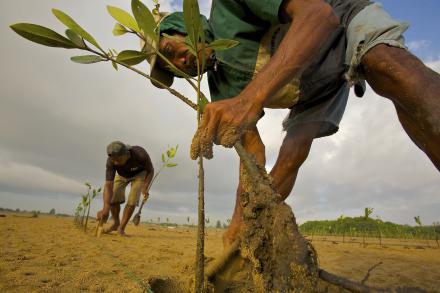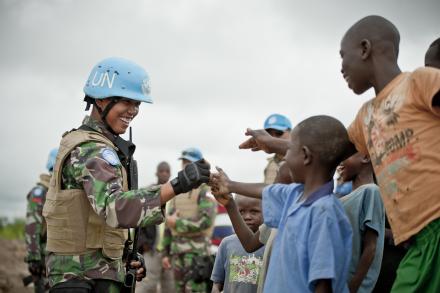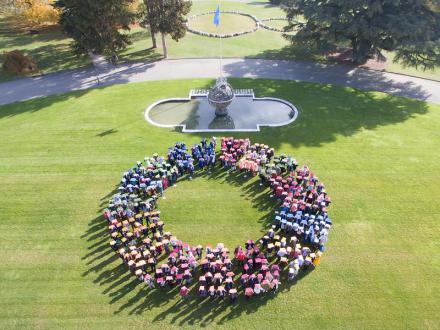
What we do
As the United Nations (UN) marks its 80th anniversary, a more responsive and efficient UN system is essential. Achieving the 2030 Agenda for Sustainable Development requires renewed commitment and bold transformation. The Pact for the Future calls for accelerated action, while the Secretary-General’s UN 2.0 vision aims to strengthen internal capabilities to better support countries. Together, these priorities guide the UN toward being more fit for purpose in a rapidly changing world.
UNSSC stands at the forefront of the UN’s commitment to building a more agile, capable, and future-ready workforce. In 2025, personnel from over 150 UN entities relied on us to advance their learning, demonstrating our ability to translate diverse UN priorities into context-specific learning solutions. Through learning, knowledge sharing, and capacity development, UNSSC empowers individuals and institutions to lead more effectively, deliver results more efficiently, and work collaboratively across mandates.
Our core focus areas—leadership and management, change and transformation, sustainable development, and peace and security—reflect the priorities of the UN system and the Secretary-General.

In order to better support countries to advance on the 2030 Agenda, the UN must transform the way it works. The UN System Leadership Framework, the Values and Behaviours Framework, and the UN 2.0 vision, coupled with UN Management Reform, are critical elements for enabling this transformation. Together, they underscore the need for UN personnel to develop new knowledge, skills, and mindsets.
UNSSC advances these priorities through its Knowledge Centre for Leadership and Management. Aligned with our mandate, we contribute to forging a common UN leadership and management culture across the UN by offering robust learning solutions and services for leadership development, change management and innovation.
Drawing from decades of experience working with UN organizations and partners, we offer a unique combination of individual learning offerings, customized learning solutions, assessment tools, and research initiatives. Our community of expert faculty and partners – all with deep UN insight and experience – help us develop more confident, capable , and collaborative leaders.
Beyond learning and capacity-building interventions, we also offer advisory services in change management and organizational development, as well as coaching, mentoring, and assessment services. Bespoke 360-degree feedback and personality profiling further strengthen leadership development by enhancing self-awareness and enabling targeted personal and professional growth.
By equipping leaders with the mindsets and capabilities needed to navigate uncertainty, inspire teams, and foster a culture of results, we help position the UN as a more agile, accountable, and future-ready organization.

The 2030 Agenda, adopted by all UN Member States in 2015, is a universal call to action to end poverty, protect the planet, and provides a vision for achieving global peace and prosperity. The Paris Agreement on Climate Change reinforces this vision by committing to limit temperature rise and pursue climate-resilient, low-carbon development pathways.
To help realize these ambitious commitments, our Knowledge Centre for Sustainable Development equips the UN system and its partners with learning, training, knowledge, and tools necessary to accelerate action. Working in close collaboration with UN entities, civil society, academia, the private sector and other partners, the Centre supports policy and operational coherence across the UN system — with particular attention to those working at the country level.
Through innovative learning tools, interactive platforms, and comprehensive educational programmes, we support integrated approaches to sustainable development and foster a culture of collaboration. As a catalyst and convener, we foster meaningful dialogue and knowledge sharing on critical issues aligned with the UN's vision and mission.

In today’s world of complex, interconnected crises, the UN must play an increasingly proactive role in preventing conflict and sustaining peace. Fostering trust, solidarity, and cooperation among nations is essential—not only for peace, but also for achieving the broader goals of sustainable development and human rights. This vision is reflected in the UN Peace and Security framework, the principles of the New Agenda for Peace, and the tenets of the Pact for the Future.
In this context, UNSSC’s Peace and Security Hub is responding to these calls by providing learning solutions which strengthen the UN’s ability to work across pillars to prevent and mitigate conflict, to build resilient societies and to contribute meaningfully to sustainable peace.
Our learning offerings help UN staff and partners to filter programming through the lens of sustaining peace by strengthening analytical capacities and fostering skills in key areas ranging from data, conflict analysis, climate, as well as supporting the Youth, Peace and Security and Women, Peace and Security agendas.
We support a system-wide shift in UN practice to ensure more coordinated, coherent, and integrated efforts to prevent violence, end conflict, and mitigate fragility. We also champion shifts in UN practice towards inclusivity, offering visibility and legitimacy to a broader range of peace actors. In partnership with leading think tanks and academia, we broker knowledge on thematic issues such as youth, peace and security as well as climate- sensitive approaches to peacebuilding.
To ensure that UN personnel are prepared to carry out their mandates in high-risk environments, we also provide scenario-based training in safety and security, equipping staff with practical skills to navigate complex operational contexts.

Recognized as a centre of excellence for UN 2.0 learning, the Staff College launched the Hub for UN Transformation. The Hub acts as a trusted partner for organizational renewal, promoting learning, experimentation, and dialogue across the UN system to enhance the ability to navigate complexity, embrace innovation, and integrate transformation into UN culture and practices. Bringing together UN entities, member states, academia, civil society, and the private sector, the Hub will serve as a channel for developing solutions, exploring emerging challenges, and testing practical applications.
The work of the Hub focuses on three complementary areas. Through its learning and advisory services, the Hub equips UN personnel with the future-ready skills, mindsets, and knowledge necessary to lead and drive transformation. These transformational themes are integrated into the broader UNSSC learning portfolio. As both a convener and a catalyst, the Hub creates opportunities for dialogue and collaboration through webinars, retreats, and discussion series. These events unite leaders and partners to design pathways for organizational change and transformation, including the incorporation of foresight and behavioural science in strategic processes and practices, and reflections on the impact of artificial intelligence in leadership. The Hub offers a safe space for experimentation, where innovative approaches and digital tools are tested and adapted for the UN context. Working with leading academic and innovation partners worldwide, it explores new ways of learning and transforming together.
Through these initiatives, the Hub contributes to building an environment that nurtures continuous transformation across the UN system.

The Staff College serves as a bridge between the United Nations and academic institutions. Our Academic Partnerships Unit connects UN personnel and partner organizations to learning opportunities and the latest knowledge offered by leading higher education institutions from across the globe. In turn, these academic institutions gain valuable insights enabling them to better respond to the real-world challenges faced by the multilateral system.